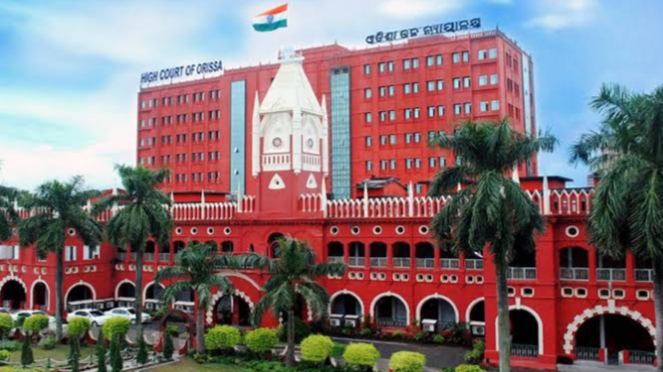Anushri Joshi
In a resonant pronouncement that underlines the sanctity of judicial integrity, the Orissa High Court has articulated a fundamental truth: while justice may be metaphorically blind, the discerning faculties of the judiciary remain ever-vigilant against subterfuge. The Court has sternly rebuked an advocate for presenting a spurious document in a bid to substantiate a claim of juvenility for a murder convict, thereby reaffirming the ethical standards indispensable for the legal profession.
A Division Bench comprising Justice S.K. Sahoo and Justice Chittaranjan Dash presided over the matter, issuing stern caution to the legal fraternity regarding the submission of fraudulent documents in the course of judicial proceedings.
The appellant, Jata @ Sanatan Hessa, had been adjudged culpable and sentenced to life imprisonment by the Additional Sessions Judge, Talcher, for the egregious crime of murder on December 4,2019. Dissatisfied with this verdict, Hessa invoked the appellate jurisdiction of the High Court, whereupon his counsel posited that the appellant was a juvenile at the time of the offence, substantiating this assertion with a purported school transfer certificate. However, the State’s rebuttal unearthed the odious nature of this claim, revealing that the certificate was a fabrication. A categorical statement from the headmaster of the alleged institution unequivocally corroborated that Hessa had never been enrolled there, nor had any such certificate been issued.
Upon discerning this egregious act, the Court summoned the advocate’s clerk, who had attested to the affidavit asserting the document’s authenticity. The clerk, feigning ignorance, contended that he executed the affidavit at the behest of the advocate, devoid of cognizance of its veracity. In light of this revelation, the advocate subsequently submitted an affidavit asserting that the brother-in-law of the appellant had provided the contested certificate. Gania Gagarai, upon appearing before the Court, confessed to delivering the certificate, claiming it was at the behest of his mother-in-law, the appellant’s mother, to facilitate the juvenile plea.
In exercising judicious discretion, the Court accepted Gagarai’s unequivocal apology and chose to discontinue the contempt proceedings against him. Nonetheless, the Bench issued a profound caution to the advocate, highlighting the gravity of his actions, which constituted a palpable affront to the integrity of the judicial institution. The Court emphasized that the legal fraternity bears the mantle of trust conferred by the judiciary, and any attempt to mislead the Court through fraudulent documents represents a severe dereliction of duty, contravening the very essence of the rule of law as enshrined under Article 14 of the Constitution of India.
The Court aptly invoked the poignant observations of former Justice Radha Charan Patnaik, who analogized the Court to a temple and advocates to its priests, emphasizing that the desecration of this temple by its priests is an affront not only to the legal profession but to the very Constitution itself. The judiciary’s reliance on precedents such as Bar Council of Maharashtra v. M.V. Dabholkar (1975) and J.S. Jadhav v. Mustafa Haji Mohamed Yusuf (1993) delineated the pivotal role advocates play in the justice delivery mechanism. It was asserted that advocates are officers of the Court, and the integrity of the justice system hinges upon their fidelity to truth, as mandated by Section 175 of the Indian Penal Code, 1860 (Section 210 of the Bharatiya Nyaya Sanhita, 2023 ), which addresses the obligation to respond to public servants duly authorized to inquire.
The advocate’s failure to disclose the provenance of the forged certificate ultimately culminated in the dismissal of the juvenile plea, underscoring the adage that “justice delayed is justice denied.” In this context, Section 193 of the Indian Penal Code(Section 229 of the Bharatiya Nyaya Sanhita, 2023), which prescribes punishment for false evidence, looms large as a reminder of the repercussion’s attendant upon the subversion of truth.
In conclusion, the Orissa High Court’s decision serves as a clarion call to the legal fraternity, reaffirming that the pillars of justice are erected upon the substratum of integrity, honesty, and a profound respect for the judicial process. The Court’s ruling serves as an admonition that the trust placed in legal practitioners must never be betrayed, lest the foundation of the judicial system be compromised.
Adv. Nityananda Panda appeared for the Appellant while the State was represented by Additional Standing Counsel Priyabrata Tripathy and Adv. Bikash Chandra Parija.
Case Title: Jata @ Sanatan Hessa vs. State of Odisha
Case No: CRLA No. 389of 2020 (I.A.No. 2788of 2023)
Bench:Justice S.K. Sahoo and Justice Chittaranjan Dash
Click here to access the order

